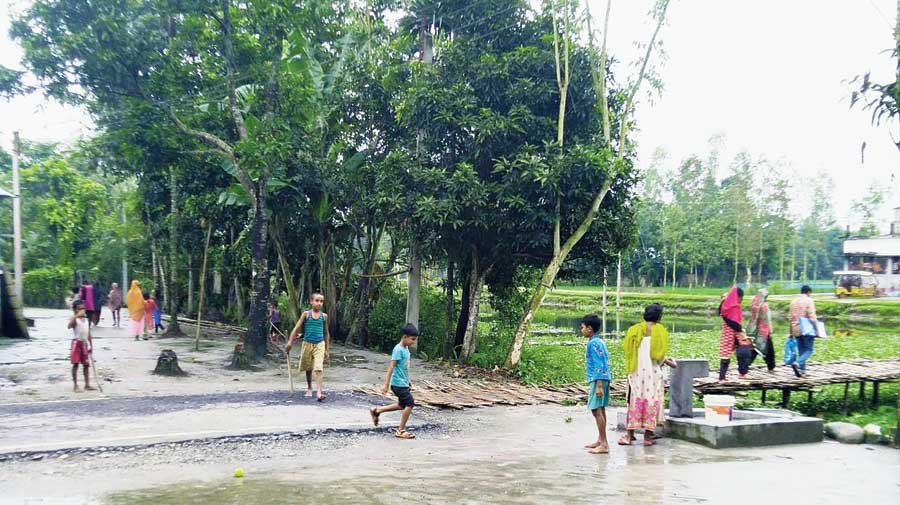An erstwhile Bangladeshi enclave, which is a part of India since the historic land boundary agreement in 2015, is scripting history again in the time of pandemic.
At a time the country’s Covid-19 infection tally has sprinted beyond 4.7 million, village Poaturkuthi has not recorded a single case of infection, at least till Sunday afternoon.
The credit for taking precautions to stay safe goes to Poaturkuthi villagers in Dinhata-II block along India-Bangladesh border. But there is near unanimity in the village that they could steer clear of the contagion so far because of Salina Parvin, the only erstwhile Bangladeshi resident (the dwellers are Indian residents now) from among the enclaves to be elected a member of the Bamanhat panchayat.
“She kept us safe by constantly counselling how to be safe in this time of pandemic... Most villagers didn’t know much about dos and don’ts. She has saved all of us by creating awareness,” said Rahman Ali, a youth of the village.
Since the outbreak of the pandemic, the panchayat member who won as a Trinamul candidate has walked up to each home with her husband Rafikul Islam, also a Trinamul leader, to tell villagers to follow health safety protocols and keep themselves safe.
“We visited every home and even now we keep a tab on each household to know if anybody has symptoms,” she said.
According to Islam, around 6,000 people reside in the village and in surrounding areas. The village has some 1,800-odd voters.
Homes apart, Salina and Rafikul also approached authorities in five local mosques, again to ensure people followed safety protocol.
“Every day, announcements are made from all mosques, asking people to follow safety guidelines. Our youths are always on alert to prevent any gathering in the village (that may flout social distancing),” said Islam.
The message seems to have percolated to every home. When villagers learnt about Covid cases from nearby villages, they decided to enforce social distancing on their own and stop going out of the village to buy essential items.
Ali said they did not have a market, for which people had to go to the Bamanhat market which residents of neighbouring villages also patronised. “So, we identified two local grounds (in the village itself) and invited vegetable vendors, fish-sellers and other traders to set up makeshift stalls. We ensured proper space between stalls. People could buy what they required without moving out of the village,” Ali said.
The youths keep watch in these markets every day so that people do not crowd or flout safety norms.
As lockdown days wore on, Poaturkuthi faced a new challenge. Over 200 youths — hailing from the village but migrant workers — came back.
Instead of rushing to meet the returnees, like in many other places, the families let the youths stay in quarantine. “We ensured all of them got their tests done and stayed in quarantine for the necessary period. We are fortunate that none tested positive. When they reached the village from quarantine centres, they had to carry their test reports and stay at home in isolation for some days,” said Islam.
Salina, now in her 40s, has seen the struggle of the enclave dwellers — including her parents and other elders faced — when they lived in a no man’s land between India and Bangladesh.
“Till 2015, we were Bangladeshis and there was not a single elected representative for us in the panchayat. As people voted for me, I felt it was necessary to work for them as these are the people who have strived for decades, demanding that our villages should be part of India,” said Salina.
She is satisfied with the village’s zero-Covid status, but a fear at the back of her mind refuses to let her relax. “It is true that no positive case has been reported so far. But one never knows if there is an asymptomatic Covid patient among us. That is why we are still going ahead with house-to-house monitoring,” said the tireless panchayat member.










